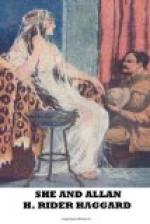Robertson and I sat down on stools that had been set for us, and ate, but he seemed so overcome by his experiences, or by his sombre thoughts, that I could not draw him into conversation. All he remarked was that we had fallen into queer company and that those who supped with Satan needed a long spoon. Having delivered himself of this sentiment he threw himself upon the bed, prayed aloud for a while as had become his fashion, to be “protected from warlocks and witches,” amongst other things, and went to sleep.
Before I turned in I visited Umslopogaas’s room to see that all was well with him and his people, and found him standing in the doorway staring at the star-spangled sky.
“Greeting, Macumazahn,” he said, “you who are white and wise and I am black and a fighter have seen many strange things beneath the sun, but never such a one as we have looked upon to-night. Who and what is that chieftainess, Macumazahn?”
“I do not know,” I said, “but it is worth while to have lived to see her, even though she be veiled.”
“Nor do I, Macumazahn. Nay, I do know, for my heart tells me that she is the greatest of all witches and that you will do well to guard your spirit lest she should steal it away. If she were not a witch, should I have seemed to behold the shape of Nada the Lily who was the wife of my youth, beneath those white robes of hers, and though the tongue in which she spoke was strange to me, to hear the murmur of Nada’s voice between her lips, of Nada who has gone further from me than those stars. It is good that you wear the Great Medicine of Zikali upon your breast, Macumazahn, for perhaps it will shield you from harm at those hands that are shaped of ivory.”
“Zikali is another of the tribe,” I answered, laughing, “although less beautiful to see. Also I am not afraid of any of them, and from this one, if she be more than some white woman whom it pleases to veil herself, I shall hope to gather wisdom.”
“Yes, Macumazahn, such wisdom as Spirits and the dead have to give.”
“Mayhap, Umslopogaas, but we came here to seek Spirits and the dead, did we not?”
“Aye,” answered Umslopogaas, “these and war, and I think that we shall find enough of all three. Only I hope that war will come the first, lest the Spirits and the dead should bewitch me and take away my skill and courage.”
Then we parted, and too tired even to wonder any more, I threw myself down on my bed and slept.
I was awakened when the sun was already high, by the sound of Robertson, who was on his knees, praying aloud as usual, a habit of his which I confess got on my nerves. Prayer, in my opinion, is a private matter between man and his Creator, that is, except in church; further, I did not in the least wish to hear all about Robertson’s sins, which seemed to have been many and peculiar. It is bad enough to have to bear the burden of one’s own transgressions without learning of those of other people, that is, unless one is a priest and must do so professionally. So I jumped up to escape and make arrangements for a wash, only to butt into old Billali, who was standing in the doorway contemplating Robertson with much interest and stroking his white beard.




